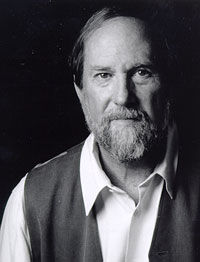I was holding forth at the dinner table,
trying to fill what I perceived to be a void.
I had just read a book on music,
about which I know very little,
and, anticipating being corrected, was saying
something about the courage to have
a full stop, the courage to break off,
the breaking of rhythmic obligations.
Then the phone rang: my daughter’s lost cat
had been found. I told everyone, and the void
seemed to fill a little with good cheer,
like vodka at the bottom of a glass.
So I told them that the baby crow
a hawk had tried to kill this morning
was still alive – three birds of different species
standing around it as if on guard.
The hawk was up on a nearby branch,
frowning, I said. No one smiled or laughed.
But we were mostly a dour group,
long neglected reciprocity dinners
finally acted upon, payback time,
and the social scientists among us —
who wouldn’t know a good story
unless research confirmed it good —
wanted me to name the three species.
Nutfinch, plutark, free-to-be – I couldn’t
help myself – and the void widened again.
I wanted to go home, but I was home.
How about the hawk, my friend
Bjorn, the clarinetist, said,
and the hungers of the strong?
And by the way, he added,
there’s no such thing as a full stop
in music – silence is a sound, an afterlife
for anyone with an ear.
I’d like to say I felt corrected,
not betrayed, and when I began to talk
about miracles and the Bee Gees singing “Staying Alive”
and Travolta being reborn before our eyes,
I’d like to say I didn’t know why.
Actually I wanted to confess that when discussing
music and obligations my mind had drifted
to baseball, its hesitations and double plays,
the beautiful choreography of dreams and errors.
I wanted to say that with some good stops
and luck it’s possible to survive.
I wanted to tell them that in my ignorance
I was serious, and that when things get lost
or are about to die all kinds of thoughts are legitimate.
It was my house, after all, and the floor was mine.
[Note: This version of “The Widening” differs from the earlier draft which appeared by mistake in the November/December 2013 issue of APR. We apologize for the error. — The Editors]
